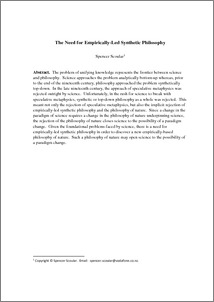Scoular, Spencer
(2013)
The Need for Empirically-Led Synthetic Philosophy.
[Preprint]
![[img]](https://philsci-archive.pitt.edu/style/images/fileicons/application_pdf.png)  Preview |
|
PDF
The_need_for_empirically-led_synthetic_philosophy_12_Dec_13.pdf
Download (274kB)
|
Abstract
The problem of unifying knowledge represents the frontier between science and philosophy. Science approaches the problem analytically bottom-up whereas, prior to the end of the nineteenth century, philosophy approached the problem synthetically top-down. In the late nineteenth century, the approach of speculative metaphysics was rejected outright by science. Unfortunately, in the rush for science to break with speculative metaphysics, synthetic or top-down philosophy as a whole was rejected. This meant not only the rejection of speculative metaphysics, but also the implicit rejection of empirically-led synthetic philosophy and the philosophy of nature. Since a change in the paradigm of science requires a change in the philosophy of nature underpinning science, the rejection of the philosophy of nature closes science to the possibility of a paradigm change. Given the foundational problems faced by science, there is a need for empirically-led synthetic philosophy in order to discover a new empirically-based philosophy of nature. Such a philosophy of nature may open science to the possibility of a paradigm change.
Monthly Views for the past 3 years
Monthly Downloads for the past 3 years
Plum Analytics
Actions (login required)
 |
View Item |



